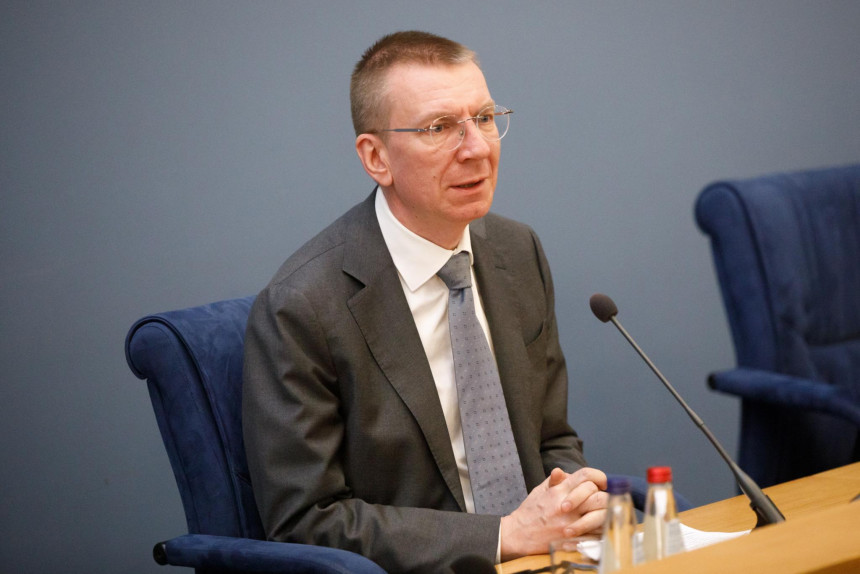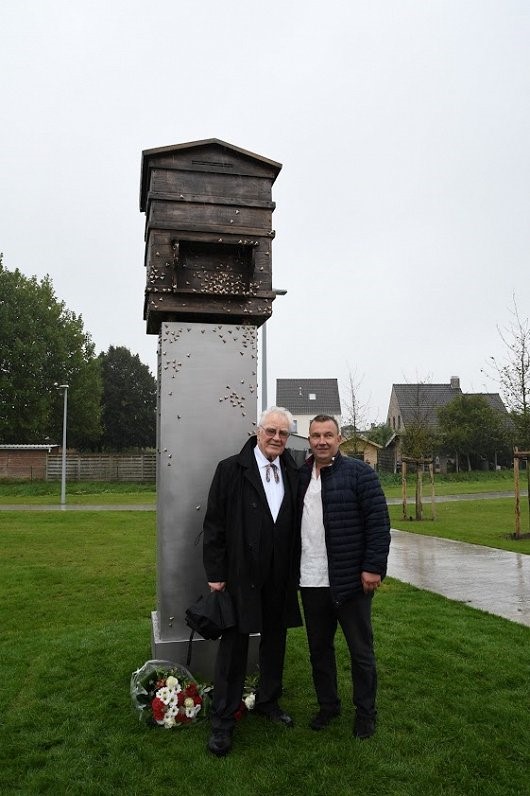Belgians want to destroy the monument to Latvian Legionnaires, but Foreign Minister Edgars Rinkēvičs won't allow it

On May 30, the Ambassador of Latvia to the Kingdom of Belgium, Andris Razāns, addressed a diplomatic note to the Belgian Ministry of Foreign Affairs, protesting against the intention to remove (move, demolish, etc.) the monument dedicated to Latvian prisoners of war "Latvian Beehive for Freedom". This monument has been located in Zedelgem, Belgium, since September 2018, and it was the intention of the Belgian municipality to create such a monument in cooperation with the Latvian Museum of Occupation.
Around €50,000 were raised for the Zedelgem monument
In 2018, the monument dedicated to Latvian prisoners of war "Latvian Beehive for Freedom" was unveiled in the presence of many local residents by Mayor of Zedelgem Annick Vermeulen, Ambassador of the Republic of Latvia to Belgium Ilze Rūse, and Chairman of the Board of the Occupation Museum Association of Latvia Valters Nollendorfs.
However, one Lev Golinkin published a gossip piece about the Legionnaires' Monument in Paris Match Belgique, quoting the main Holocaust businessman, Simon Wiesenthal Centre spokesman Efraim Zuroff, who - as always - claimed that the Legionnaires' Monument was a blasphemy against the memory of the Nazi victims. The Jewish propagandist was joined by Belgian leftist politicians repeating the mantra of "Latvian Nazis".
Last year, an international conference was held to examine the historical fact that 12,000 Latvian Legionnaires were held in the Zedelgem prisoner-of-war camp, even though everything has already been examined countless times. The discussions were long and fruitless, and in the end the Latvian history researchers Didzis Bērziņš and Mārtiņš Kaprāns gave in to the pressure of the panelists without much of a fight and signed a consensus opinion that decided to remove the monument.
This was strange, because the Museum of Occupation, which had taken the initiative to create the monument, had raised around 50,000 euros in donations. So this money has gone, as they say, down the drain?
That opinion was humiliating for Latvians. Although the panelists noted that, unlike all other voluntary SS units, the Latvian Legion was not considered a criminal organization by either the Nuremberg International Military Tribunal or the US Displaced Persons Commission, the same speakers claimed that some Legion soldiers had previously been members of a police battalion and had committed crimes while there, but then "formally joined the Legion". Moreover, Latvia was part (!) of the Soviet Union. Excuse me, but how could Latvian Legionnaires have influenced Latvia's entry (or not) into the Soviet Union?
Although all this was nonsense that could have been refuted with concrete historical facts, the Latvian panelists, for some reason, did not make much effort to do so...
Abusing propaganda campaigns
After last year's panel discussion, talk about the monument died down. But it did not disappear completely. The municipality of Zedelgem has just announced its decision to remove the monument without consulting the Museum of Occupation. This was and is unacceptable to Latvia. The Latvian Ministry of Foreign Affairs has become involved and is now waiting for precise information from Belgium on the future fate of the monument, as well as calling on the municipality of Zedelgem to resolve issues related to the monument in cooperation with the Latvian Museum of Occupation.
On May 26, the Latvian Foreign Minister Edgars Rinkēvičs sent a letter to the Minister-President of Flanders, reiterating his call for a professional discussion between historians from the Baltic States, Belgium, Poland and other Western European countries on the historical context of the monument.
Jānis Beķeris, Press Secretary of the Ministry of Foreign Affairs, added that the previous discussion (last December) had not been successful, as no clear and concrete solutions for the future of the monument had been proposed, nor was it clear why it had not been decided on placing a new explanatory plaque on the monument.
On December 10 last year, in response to the call to remove the monument, Latvian Foreign Minister Rinkēvičs sent a letter to the Deputy Prime Minister of the Kingdom of Belgium and Minister of Foreign Affairs, European Affairs and Foreign Trade and the Federal Cultural Institutions, Sophie Wilmès, expressing concern about the events in Zedelgem and asking the Minister to pay closer attention to the issue.
In his letter, Rinkēvičs also expressed his deep regret at the recommendations of the previous international group of historians to relocate the monument. It was suggested that the municipality of Zedelgem was influenced by a campaign of disinformation and aggressive vilification, i.e. that there were forces that were abusing such campaigns to achieve their geopolitical goals.
Beķeris added that the aim of the Ministry of Foreign Affairs was to ensure that the history of the Latvian state and people, as well as the memorials and monuments that symbolized it, were treated with respect and impartiality.
We must defend the memory of the Legionnaires
In any case, the pressure on the municipality of Zedelgem has apparently been so great that the removal of the explanatory plaque will not be enough. Of course, there are fears that the monument may simply be demolished. However, Jānis Beķeris is more optimistic: he believes that one of the possible options is to move the monument to the site where the Latvian POW camp once stood. It is also hoped that the next historians' discussion will come up with possible solutions to preserve the memory of the Latvian Legionnaires in a dignified manner.
This was once made abundantly clear by the Museum of Occupation: “It is necessary to emphasize that during World War II the occupation forces carried out illegal mobilization in Latvia. The majority of Latvian soldiers were forcibly conscripted into the ranks of the German armed forces. It is important that the Latvian legionnaires were never members of the SS organization. The monument “Latvian Beehive for Freedom” glorifies neither the SS as a whole nor the Waffen-SS. It does not use any political symbols.
The monument is dedicated solely to the Latvian prisoners of war who were held in the Zedelgem camp under very difficult conditions. Quite a large number of prisoners fell ill and died. There is no basis for the claim that the prisoners of Zedelgem as a whole were involved in war crimes or genocide. The Belgian Deputy Prime Minister and Minister for Justice, Vincent Van Quickenborne, has quite rightly pointed out that suspicions of any crimes must be properly investigated. It is incorrect to attribute any collective guilt to Latvian soldiers."

This idea was poetically and emotionally confirmed by the sculptor of the monument, Kristaps Gulbis: "In Zedelgem camp there were around 12,000 Latvian soldiers. This is equivalent to the number of bees in a hive. My idea is to unite in this monument the common European values and symbolic language understood by all Europeans with something special and visually characteristic only to Latvia. The Latvian bee colony in Belgium. The bee colony is a nation. The hive is their state with its own army, law and order. Bees are peaceful. They do not attack of their own accord. They sting only when they feel threatened. They defend, fight and die for their hive, colony and freedom."
In the light of Russia's war in Ukraine, this defense of our legionaries' monument is increasingly important: Latvians defended their country against Russian dominance and atrocities. Just as Ukrainians are doing now. And we must now defend the Latvian Legionnaires and their memory.